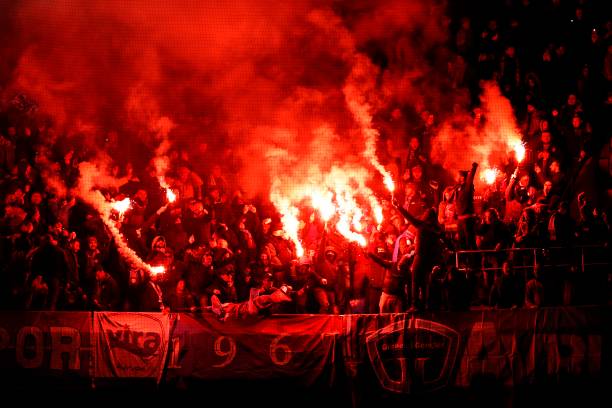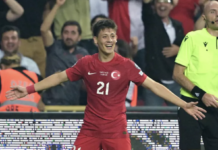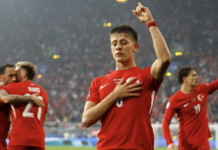
Debutants are unfancied but have a world-class goalkeeper and a generational attacking talent in Khvicha Kvaratskhelia
By Mamuka Kvaratskhelia
This article is part of the Guardian’s Euro 2024 Experts’ Network, a cooperation between some of the best media organisations from the 24 countries who qualified. theguardian.com is running previews from two countries each day in the run-up to the tournament kicking off on 14 June.
Prospects
In March the dream of all Georgian fans came true as the team qualified for the European Championship. Some supporters had been waiting for that moment for 34 years. Back in 1989 the struggle was to break free from the shackles of the Soviet Union and a year later Georgia won that battle and, football-wise, had its first national championship. Three years later the country became a member of Fifa and Uefa.
Since then Georgia have taken part in many qualifying campaigns without reaching the finals. The greatest European success of Georgian football was achieved in 1981, before the break-up, when Dinamo Tbilisi beat East German side Carl Zeiss in the final of the Cup Winners’ Cup. Nearly half of the Tbilisi team played for the Soviet Union national team at the time.
Since then came only disappointments until Uefa introduced the Nations League, giving smaller nations a better chance of reaching a major tournament. Georgia took their chance and qualified for Euro 2024 by overcoming Luxembourg and Greece in the playoffs.
Little is expected of this team as debutants but they have one of the best goalkeepers in the world, Giorgi Mamardashvili, as well as an attacking force in Khvicha Kvaratskhelia, so anything is possible. Especially as those two stars are backed up by a group of talented and hard-working players.
The manager, Willy Sagnol, prefers to play 3-5-2 although it can also be described as a 5-3-2 with the wing-backs, likely to be Otar Kakabadze on the right and Giorgi Tsitaishvili, often helping out in defence. “Georgia had never qualified for a competition before, and yet the day after the win over Greece, people were already talking about making the last 16,” Sagnol told fifa.com. “That’s kind of the mindset over here – it’s all or nothing.
“I think it’d be stupid for me to say: ‘We need to win this or that.’ The main idea is to create a good impression of football in Georgia, and if we can get a little extra confidence and gain some more experience, then maybe we can have a more successful qualifying campaign for the 2026 World Cup.”
The coach
When the president of the Georgian Football Federation, Levan Kobiashvili, made the former France and Bayern Munich defender Willy Sagnol the new national team coach, the pessimists immediately declared it would end in failure. But with his approach, mentality, innovation and talent, Sagnol made history. “Will we qualify from the group or not? I think it is wrong to talk about that for now as it will only add to the pressure on the players,” he said: “However, the potential is there.”
The icon
Khvicha Kvaratskhelia – “Kvaradona” – is the icon of not only football fans in Georgia but the whole country. After the 23-year-old’s performances for Napoli and the national team every youngster suddenly seems to want to become a footballer. In fact, the number of children enrolling at football schools in the country has nearly doubled. Four years ago, North Macedonia defeated Georgia in a decisive game and reached Euro 2020. The Napoli striker, Elif Elmas, was instrumental for the North Macedonians while Kvaratskhelia missed the game with Covid-19. A year later the Georgian moved to Naples, where he relegated Elmas to the bench – and he went on to score in both Nations League games against North Macedonia in 2022.
One to watch
Giorgi Chakvetadze has the talent to be one of the stars of the tournament but injuries have hampered his progress. He made his breakthrough in Georgian football and contributed towards the national team’s success in the Nations League. Moved to Gent in Belgium in 2017 and made a promising start but then suffered a serious injury. Joined Watford, initially on loan, in the summer of 2023 before transferring to the Championship side permanently in February. The 24-year-old arrives at the Euros in good form, and seemingly without fitness problems, having made 34 league appearances in 2023-24.
The maverick
Zuriko Davitashvili had a brilliant season in the French second division and it is not impossible that he will join one of the continent’s bigger clubs after the Euros. He is a very dedicated player and a high-class individual talent. The 23-year-old former Dinamo Tbilisi player qualifies under this heading because no one really knows what he will do on the pitch. At last year’s Under-21 Euros he collected the ball and ran past five Netherlands defenders to score a beautiful goal that those present will never forget.
The spine
Mamardashvili is the undisputed No 1 goalkeeper after an impressive campaign with Valencia in La Liga. The defence has been well marshalled by the captain, Guram Kashia, for more than 10 years and he brings stability and experience to the side. The key midfielder will be Otar Kiteishvili, who has been at Sturm Graz in Austria since 2018. The link between midfield and attack is, of course, Kvaratskhelia. Georges Mikautadze, who has spent this season on loan at Metz from Ajax, will lead the line.
Celebrity fan
There are no huge rock or film stars who support the national team but the former Milan and Georgia defender Kakha Kaladze is now the mayor of Tbilisi so he probably counts. He does not miss a single national team game and always supports them with his former teammate Levan Kobiashvili, the Georgian Football Federation president. As far as “actual fans” are concerned Beka Nozadze has been at the forefront of Georgian fan culture. Amazingly and from a young age, he organised supporters and laid the foundation for an age-old tradition: a 3km march to the stadium with songs and pyrotechnics. He also established a popular song at the stadium, which include the lyrics: “Don’t be afraid, we are with you!’’
Culinary delight
Georgia is a country where gourmets come from all around to taste the local cuisine. If you get to a Georgian table once, you will never forget the taste of traditional dishes such as khinkali, khachapuri, satsivi, khashlama, elarji and dedas puri. Georgia is also the birthplace of wine and, as the saying goes, thousands of grapes grow here. For a long time, Georgians watched their national team while eating the above dishes at the table but there has been a move towards western European cuisine recently, with fish and other seafood particularly popular.
Georgia team guide written by Mamuka Kvaratskhelia for Lelo.ge









